Allianz Arena: Bayern Munich
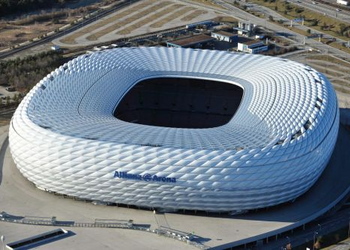
euroluftbild.de/Grahn [CC BY-SA 3.0 de, CC BY-SA 3.0 or GFDL], via Wikimedia Commons
The Allianz Arena is known throughout the world as the home of one of Germany’s most famous and successful clubs, Bayern Munich. What not everyone outside of Germany knows, however, is that it was also the home of TSV 1860 München, a Bundesliga 2 side, from 2005 to 2017. From 1925 until 1972 both clubs played at the Stadion an der Grünwalderstraße before both then moving to the newly erected Olympiastadion, built specially for the 1972 Olympic Games. Their fates remain intertwined when they moved to the Allianz in 2005, although TSV have since moved back to Stadion an der Grünwalderstraße.
Bayern are, of course the more successful of the two clubs in Germany’s second city. They hold the record for the number of top-flight wins in the country, having snapped up 31 titles. They’ve also won twenty domestic cups and have enjoyed a huge amount of success on the European stage. They’ve won the European cup six times, with the most notable wins coming in the 1970s when they won three cups back to back.
Their years at the Allianz have been incredibly successful though, with 9 Bundesliga wins on the trot from 2012/13 onwards, and more silverware besides including two of their European Cup wins.
Stats
| Allianz Arena Stats | |
|---|---|
| Year Opened | 2005 |
| Capacity | 75024 |
| Average Attendance | 75000 |
| Record Attendance | 75000 (B Munich v Schalke 04 (2015)) |
| Pitch Size | 105 x 68 (7140) |
| Nickname | Schlauchboot (inflatable boat) |
| Former Name | FIFA World Cup Stadium Munich, Fußball Arena München |
| Owner | Allianz Arena München Stadion GmbH |
| Sponsor | Allianz Insurance |
| Clubs Hosted | FC Bayern Munich |
| First Fixture | TSV 1860 v FC Nürnberg (30/05/2005) |
| Bayern Munich Stats | |
|---|---|
| Year Founded | 1900 |
| Nickname | Der FCB (The FCB), Die Bayern (The Bavarians), Stern des Südens (Star of the South), Die Roten (The Reds), FC Hollywood |
| Club Mascot | Berni |
| Rivals | Borussia Dortmund, TSV 1860 München, FC Nürnberg, FC Kaiserslautern, Borussia Mönchengladbach, Real Madrid, A.C. Milan, Manchester United |
| Previous Stadiums | Stadion an der Grünwalderstraße, Olympiastadion, Leopoldstraße |
| Kit | Red (Home) / Black (Away) / White (Third) |
| Training Ground | Säbener Strasse |
| Shirt Sponsor | Deutsche Telekom |
| Team Owner | FC Bayern München AG |
| Record Goalscorer | Gerd Müller (573) |
| Record Appearances | Sepp Maier (702) |
Allianz Arena Photos
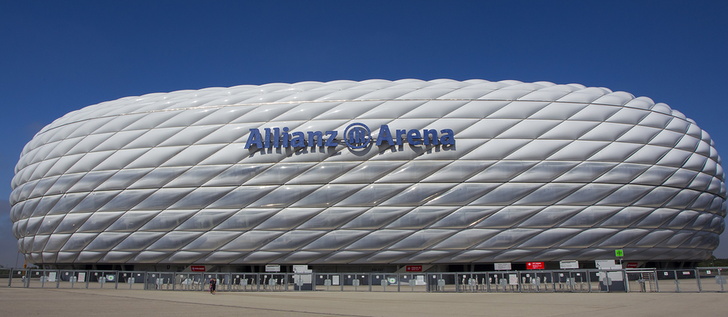
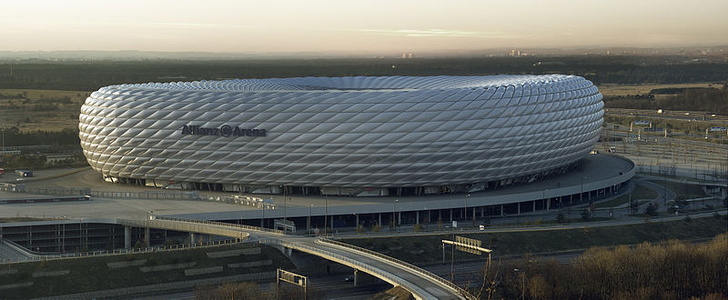
By User:Mattes (Own work) [Public domain]
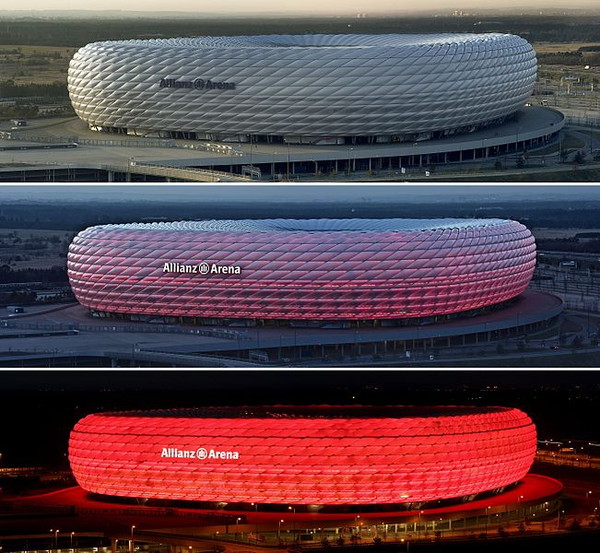
By Richard Bartz
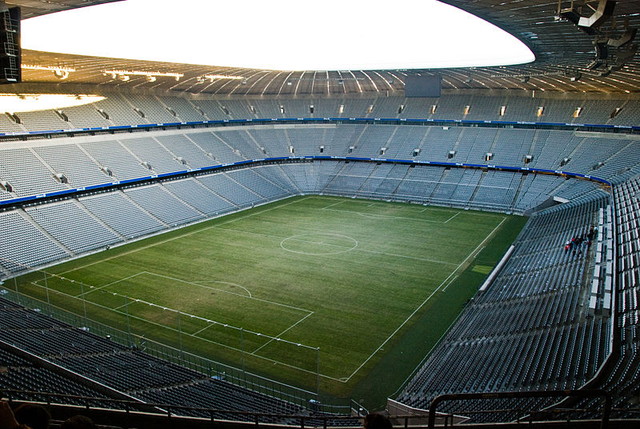
By Michal Osmenda from Brussels
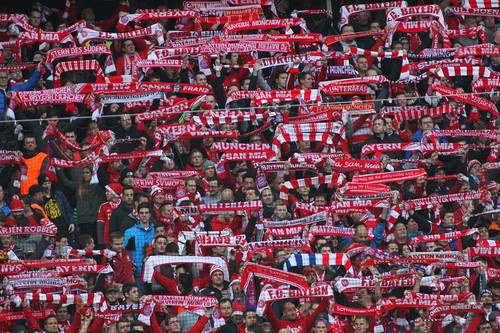
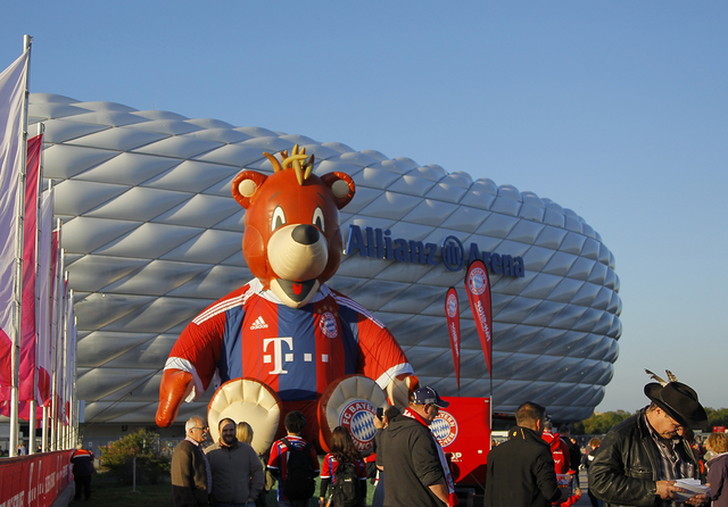
Allianz Arena Seating Plan and Where to Sit
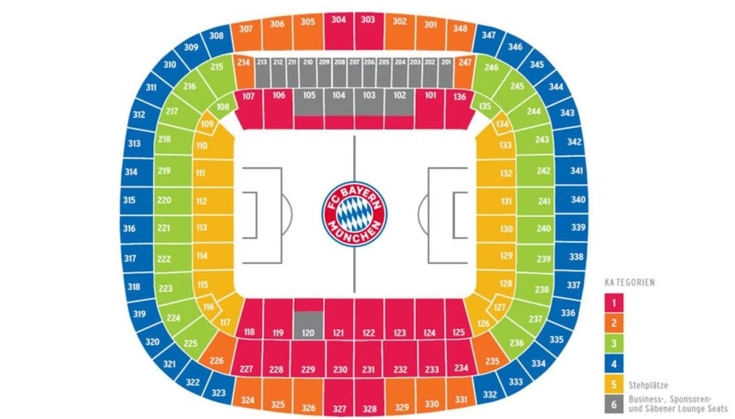
As the name suggests, the Allianz is an arena rather than a more typical ‘English Style’ stadium with separate stands on each side of the pitch. Instead it has a ‘Bowl Style’ design that is more common in modern stadia. There are still separate sections, though, so here’s a little bit of information on each of them:
- The North Stand – The Allianz has three tiers, with each row separated by executive boxes. The North Stand is behind the Northern goal and follows this design, with the top tier being the smallest of the three.
- The East Stand – This section of the ground is the largest as far as the amount of seating is concerned, with the top section following the curve of the roof and the fact that the stand runs along the side of the pitch allowing for the additional seats.
- The South Stand – Known locally as the Südkurve, this section of the ground is where the most vocal fans of both clubs tend to like to sit.
- The West Stand – Typically considered to be the main stand at the ground, this section of stadium contains the players’ tunnel, the changing rooms, the dugout and the executive seating.
Bayern Munich Ticket Prices
Bayern Munich charge different amounts of money depending on where you want to sit in the ground and, as you might expect, they don’t spend time targeting an English audience with their ticketing schemes. Because of that it isn’t always easy to know how much you’ll have to pay for your seat should you be hoping to buy your tickets directly from the club. Most English fans will look to buy tickets through third party sellers, but here are the five category prices for Bayern matches:
- Category 1 – €70
- Category 2 – €60
- Category 3 – €45
- Category 4 – €35
- Category 5 – €15
How To Get Bayern Munich Tickets
Bayern tickets do tend to sell out really quickly, thanks to the quality of the football on offer and the cheap cost of tickets. You can look to get them from the club’s official website as well as from their own official secondary market, where fans sell tickets to each other at face value. You can, of course, also call up their ticket office and they’ll let you know what you need to do to buy tickets, presuming you get through to an English speaking sales person.
Where to Buy
Getting To Allianz Arena
Munich is Germany’s second city and as such the transport options available there are excellent. Here are some of the more traditional routes you might want to consider for your journey:
Train – A journey from Kings Cross-St. Pancras to Munich isn’t exactly simple, but it is picturesque. The Eurostar will take you to Brussels and from there you can get a train to Frankfurt or somewhere else, such as Cologne, and then enjoy a transfer into the Germany city. It will take somewhere around nine hours to complete your journey, though, so do bear that in mind before you set off.
Once you’re in Munich you’ll want to take the U6 underground line from Marienplatz to Frottmaning. It will take you just over a quarter of an hour to do that part of the journey and from there you can walk to the ground in about twenty minutes.
Bus – The fact that the underground system in Munich is so good means that buses aren’t actually the most convenient option to get to the ground. From Marienplatz station, for example, you need to take a tram and two buses before a ten minute walk to get to the stadium. There is an excellent online system you can use to plan your journey if you do want to get the bus, however.
Car – From the West take the A8 then change onto the A99 and follow it until you see signs for the ground. From the North take the A9 then the A92 and the A99 again. From the airport you’ll want the A92 then the A9, whilst from the South or the East the A99 onto the A9 will be what you’re looking for.
By Air – Airport Franz-Josef-Strauss is located about 20 kilometres away from Munich city centre and has excellent connections thanks to the S-Bahn and the Lufthansa Airport Bus. If you’re on the S-Bahn then the S1 and S8 will both take you to Munich centre from where you can follow our directions from above.
Taxi – A taxi from the airport will take about 45 minutes and cost in the region of €60. From Marienplatz Station to the ground you’ll be looking at a twenty minute journey at a cost of roughly €30.
Parking Near Allianz Arena
The Allianz Arena has 9,800 spaces in a multi-story car park as well as 1,200 VIP spaces and 150 for the disabled. On match days the car parks are open from 8am and the fee will be €15.
Useful Resources
Allianz Arena Hotels
Munich is the heart of beautiful Bavaria, so you’ll be faced with a huge number of hotel options for your stay in the city. Here are some of our favourites, to help you narrow down your choices:
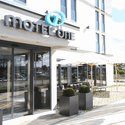
Motel One München-Garching - £50+
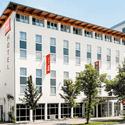
ibis München Garching - £65+
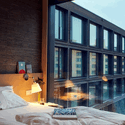
SOULMADE by Derag Livinghotels - £90+
Pubs and Bars Near Allianz Arena
Bavaria is somewhat stereotypically known as the place to go for beer halls and delicious German food. Stereotypes aren’t always a bad thing, though, and Munich certainly has its fair share of excellent pre-match locations. There aren’t many places close to the ground but here are some city centre boozers for you to consider:
Kilians Irish Pub
Augustiner-Keller
Arena Treff
Facilities
The Allianz Arena is over a decade old now, but it’s still a top class place to go and watch a football game, with all of the usual things you’d expect from such a place. There are numerous locations to buy food and drinks on the excellent and clean concourses, although like all German stadiums, you are limited to bratwurst, pizza, and chips. It doesn’t have the same sort of personality as many UK grounds but that’s Germany for you.
Hospitality
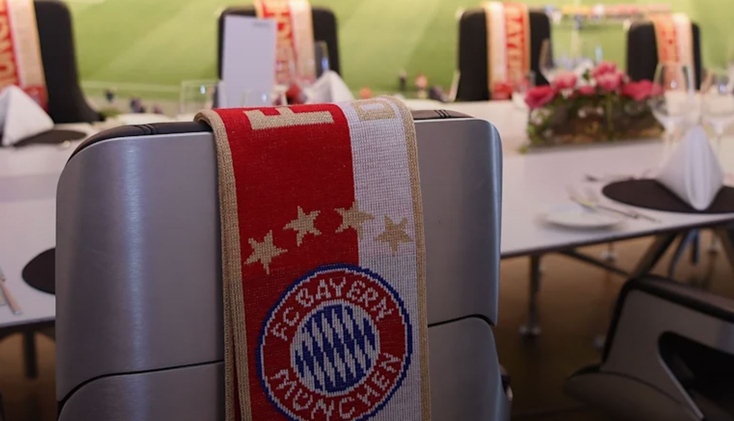
The Allianz Arena has enough space for around 75,000 people to enjoy a match or two, but it also has 106 VIP boxes from where you can enjoy an incredible match day experience. As well as the usual service you’d expect from a VIP box, you’ll also get some of the best seats in the house.
VIP box access isn’t your only hospitality option at the home of Bayern though. The club also offers what are bizarrely called ‘Business Seats’; state-of-the-art seating with excellent views of the pitch. Regardless of which game you attend, you’ll not only enjoy a comfortable seat but you’ll also get first class catering and the chance to watch football from a privileged position.
Private Hire
The Allianz Arena is available for numerous private occasions, whether they be the likes of a party, an exhibition or a presentation. There is an event area ideal for just such a thing as well as a cinema that can seat seventy. There is a stage where you can host a press conference, a speech or something similar, Bayern’s Hall of Fame that is an ideal location for cocktail parties or an exclusive dinner and numerous other locations throughout the ground that would no doubt be suitable for any need you have. If you’re going to be hosting any sort of event in Munich then the Allianz Arena should be top of your list of locations to consider.
Stadium Tours & Museum
The Allianz Arena offers a number of tour options, with the ground also containing the largest club museum in the country. A Combi-Tour lets you see places that are normally hidden from the public, such as the press conference area, the dressing rooms, the players’ tunnel and the mixed zone. As part of your ticket you’ll also get entry into the museum where you’ll be able to learn all about the history of Bayern Munich. It takes around an hour to do the tour and the club recommends you put at least the same amount of time to one side to go around the museum.
A VIP Tour takes you the extra distance, allowing you to see the view from inside an executive suite, getting a look around the upper tier with an explanation of how the famous external facade works. You’ll also get to see the same areas as the normal tour does, but you’ll enjoy a glass of sparkling wine and access to the Business Club. This takes closer to two hours, with half an hour set aside for the drinks reception in the executive box that comes at the end of the tour. The Combi-Tour costs €25 for adults, €22 for concessions and €11 for children between 6 and 13. The VIP Tour is quite a bit extra a €45 per person.
About Bayern Munich

Do Bayern need much introduction? Founded in 1900 by a group of football players and under the leadership of Franz John, the club has gone on to win pretty much everything there is to win both in Germany and in the European game. Interestingly, Bayern weren’t part of the Bundesliga when it was formed in 1963, but by the 1970s they were not only in it but also enjoyed arguably their greatest period of success. With the now household name of Franz Beckenbauer wearing the captain’s armband they won three successive European Cups. Since they were adopted into the top-tier of German football they have gone on to win, at the time of writing, a record 31 titles.
It hasn’t always been sunshine and lollipops for Bayern, however. During the 1990s their success dried up a touch and many of the players were found to be in the papers because of their social lives more than their performances on the pitch. This led to the club earning the sarcastic nick-name of FC Hollywood. It wasn’t until the appointment of Ottar Hitzfeld in 1998 that the club began to get back on track and deliver a degree of consistency. In 2000 he led them to their third league and cup double on the year of the club’s centenary. The following year they followed it up with a league and Champions League double, winning the famous European trophy for the fourth time, 25 years after the last time they had lifted it.
Allianz Arena History
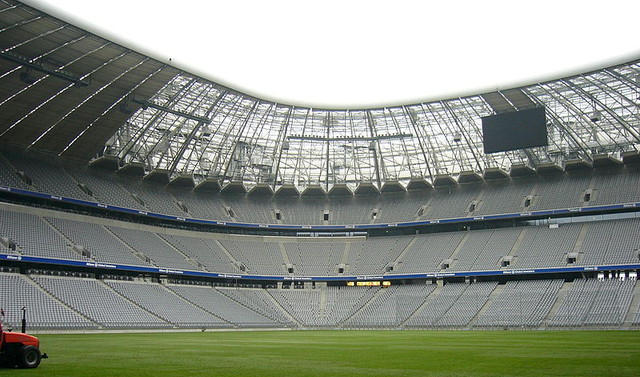
The Allianz Arena opened in 2005 and originally both Bayern and 1860 Munchen enjoyed a 50% stake in it. Financial difficulties meant that 1860 Munchen had to turn to their rivals for help, however, and in April of 2006 Bayern Munich bought out their neighbours and now own 100% of the ground. It cost Bayern €11 million and the agreement allowed 1860 to play their games there without the constraints of ownership, instead paying Bayern rent for the privilege. Bayern now held the power though, and terminated the arrangement in July 2017.
Despite the fact that the ground was used during the 2006 FIFA World Cup and often hosts Germany matches, not everyone loves the stadium. Its nickname is “Schlauchboot”, which means ‘the inflatable boat’ owing to the strange look of the ground from the outside. The translucent material that covers it did have a purpose, however. It would originally change colour depending on who was playing their home games in it from one minute to the next, giving it a very modern feel even more than a decade after it first opened. Obviously, these days only one club play there, so they could just use it for a massive disco now if they wanted to.
Future Developments
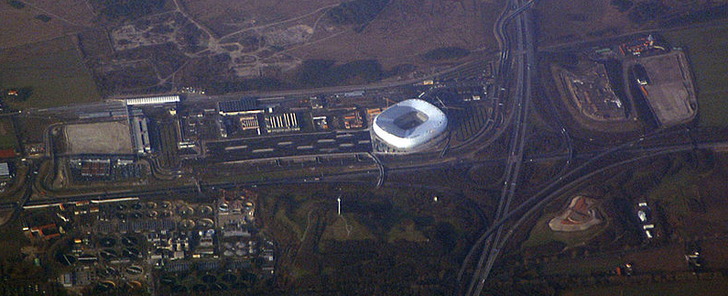
The capacity of the Allianz Arena was expanded to 75,000 in 2015, making it the second largest stadium in Germany behind Borussia Dortmund’s Westfalenstadion. There have been discussions to expand slightly to 77,000, but as of yet, no work has taken place.
